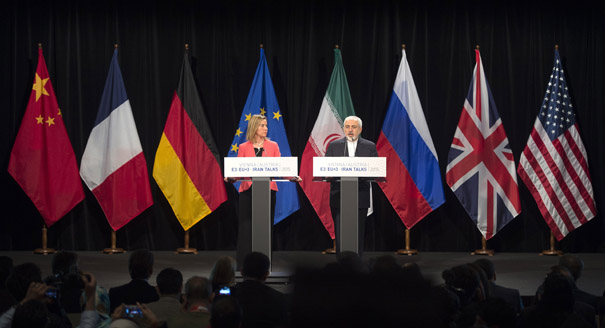It’s dangerous to dismiss Washington’s shambolic diplomacy out of hand.
Eric Ciaramella
{
"authors": [
"Cornelius Adebahr"
],
"type": "other",
"centerAffiliationAll": "dc",
"centers": [
"Carnegie Endowment for International Peace",
"Carnegie Europe"
],
"collections": [
"Europe’s Southern Neighborhood",
"Iranian Proliferation"
],
"englishNewsletterAll": "",
"nonEnglishNewsletterAll": "",
"primaryCenter": "Carnegie Europe",
"programAffiliation": "EP",
"programs": [
"Europe"
],
"projects": [],
"regions": [
"Middle East",
"Europe",
"North America",
"United States",
"Iran",
"Western Europe"
],
"topics": [
"Foreign Policy",
"Nuclear Policy"
]
}
Source: Getty
European actors should take the initiative not only to implement the deal itself but also to help create an environment, both regionally in the Middle East and politically, that supports such implementation.
Source: Washington Quarterly
The July 2015 nuclear agreement with Iran is not only a victory for diplomacy, but also very much a transatlantic success. The deal that hides its groundbreaking qualities in the non-descript title “Joint Comprehensive Plan of Action” (JCPOA)1 represents the conclusion—and validation—of a process that three European states began in 2003. As a sign of transatlantic interdependence, U.S. opposition to engage Iran post-9/11 required the Europeans to begin a process that, ultimately, could only conclude with the United States at the table, which joined the talks alongside China and Russia in 2006. Throughout these years, the transatlantic alliance has been critical to driving the negotiation process forward, combining diplomatic and economic pressure with the right incentives to nudge Tehran toward accepting serious limitations on its purportedly civilian nuclear program.2 In other words, only because the United States and Europe worked so closely on this file could they rally the international support that was necessary to first isolate Iran and then successfully conclude the negotiations.
However, transatlantic cooperation is likely to become more difficult going forward. The U.S. government faces continued domestic resistance to even accepting the limited cooperation this agreement stipulates with Iran, a 36-year-long U.S. adversary. In this climate, it is questionable how much Washington can play a proactive role in implementing the JCPOA over the coming years. Europe—referring to the European Union and/or more specifically France, Germany, and the United Kingdom (also known as the E3/EU)—as the initiators of this process, may be less hampered by internal politics. Yet, they are absorbed with crises closer to home including Russia’s war and the resulting instability in Ukraine, continued uncertainty about the viability of the Eurozone, and the recent influx of refugees from the Middle East and North Africa, to name but the most pressing three.Still, Europe has an enormous interest in seeing the deal through for objective security reasons (preventing Iran from getting a nuclear bomb) as much as for its ownership of the JCPOA. At the same time, it lacks the domestic opposition present in the United States that could prevent it from engaging Iran beyond the agreement. This is why Europe can and should take the Iran deal forward, and enlist U.S. support to do so as a natural extension of the close cooperation during the negotiations.
This article looks at how European actors should take the initiative not only to implement the deal itself but also to help create an environment, both regionally in the Middle East and politically, that supports such implementation. It outlines how the European Union should actively seek support from the United States to continue to work together on and beyond the nuclear file. In particular, the transatlantic partners should:
This article was originally published in the Washington Quarterly.
1 Joint Comprehensive Plan of Action, Vienna, July 14, 2015, http://www.eeas.europa.eu/statements-eeas/docs/iran_agreement/iran_joint-comprehensive-plan-of-action_en.pdf.
2 For an early proposal of a transatlantic initiative on the nuclear file when there was not any willingness yet in Washington to talk to Iran, see Robert J. Einhorn, “A Transatlantic Strategy on Iran’s Nuclear Program,” The Washington Quarterly 27, no. 4 (Autumn 2004), pp. 21–32, http://www.tandfonline.com/doi/abs/10.1162/wash.2004.27.4.21.
Carnegie does not take institutional positions on public policy issues; the views represented herein are those of the author(s) and do not necessarily reflect the views of Carnegie, its staff, or its trustees.
It’s dangerous to dismiss Washington’s shambolic diplomacy out of hand.

Eric Ciaramella
EU member states clash over how to boost the union’s competitiveness: Some want to favor European industries in public procurement, while others worry this could deter foreign investment. So, can the EU simultaneously attract global capital and reduce dependencies?

Rym Momtaz, ed.
Europe’s policy of subservience to the Trump administration has failed. For Washington to take the EU seriously, its leaders now need to combine engagement with robust pushback.

Stefan Lehne
Leaning into a multispeed Europe that includes the UK is the way Europeans don’t get relegated to suffering what they must, while the mighty United States and China do what they want.

Rym Momtaz
An exploration into how India and Pakistan have perceived each other’s manipulations, or lack thereof, of their nuclear arsenals.

Rakesh Sood